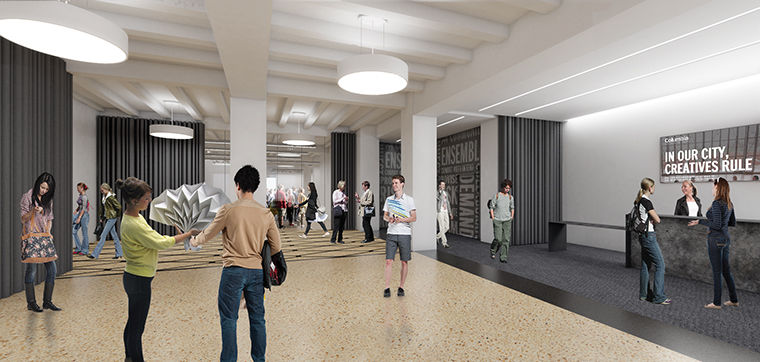Show goes on—renovation plan announced for Getz Theater
October 10, 2016
Columbia’s Getz Theater will be redesigned into a courtyard-style theater as a part of a 2-year renovation plan announced by the college Oct. 4.
The renovations for the theater, 72 E. 11th St., were announced on Columbia’s website and costs about $9 million. Columbia will be working with Gensler, an international architectural firm, for the renovation. Gensler principal David Broz will lead the project.
“It’s an amazing opportunity to refresh the space and provide new instruction that will go on in that department,” Broz said.
According to college spokeswoman Cara Birch, the renovation will be funded by the college’s capital budget. Part of the $9 million will be taken from the $7 million building investment budget for the 2017 fiscal year. The rest will be taken from the same budget in 2018.
According to John Kavouris, associate vice president of Facilities and Operations, the renovation will lead to a more intimate experience during shows. The renovation will make the theater one of only two courtyard-style theaters in the city.
Kavouris described the theater design as classic, with every seat facing forward. The new courtyard style will change the design, so the theater is three-sided, with seats added to the sides, and will include balcony seating. A side and back stage will also be added, along with production workrooms with glass walls on the first floor. The second floor will have dressing rooms, a makeup room and a raised catwalk to improve lighting and instruction, according to Columbia’s website.
“The goal is to provide a good, solid academic teaching facility to improve the student experience and provide the school with that venue that’s been missing for so many years,” Kavouris said.
Cal Walker, a junior theatre major, said the renovations could benefit performers and audience members. Although the quality of the space should not matter, Walker said it does have an effect on performances.
“[In] spaces where you’re super close to the audience, your performance changes because you’re instantly more self-conscious of every little gesture,” Walker said.
Genesis Castillo, a sophomore theatre major, said she was glad to hear about the renovation and said it shows Columbia takes theater seriously.
“The area is so small and restricted, and being one of Chicago’s bigger performing schools, we should have a theater where you walk in and you’re like, ‘Wow, this is where something great is about to happen,’” Castillo said.
Kavouris said the renovation will ultimately lead to a smaller space. Currently, the theater’s capacity is 300 but is estimated to accommodate 175–200 people after the renovation.
According to John Green, professor and former chair of the Theatre Department, faculty and staff in the department met with Broz and Kavouris to discuss various options for the renovation, ultimately choosing the courtyard style.
“It’s a brilliant design because when you sit in a courtyard theater, the audience feels very close to the action,” Green said.
Broz and Kavouris expect some challenges while renovating the 87-year-old building. The building, originally built in 1929 and acquired by Columbia in 1981, has a lot of deferred maintenance that may lead to additional work.
“The show will go on,” Broz said. “Any bumps in the road are minor in the grand scheme of things of teaching kids in the theater for the next 50 years.” Broz, who has done previous renovations at Columbia, including the recent “ghost facade” renovation to the 618 S. Michigan Ave. Building, said he is passionate about working on urban educational spaces.
“It’s always impactful to make a difference on the classroom environment and the places kids learn and to be able to impact a public venue like this that not only teaches the kids, but also is where the public can come in and see the students shining at their best time,” Broz said.
Broz said he is most looking forward to others seeing the finished outcome.
“The first student production in there will be a powerful experience to watch the students be excited about their space, and the public react to this new environment that will allow students to achieve at a higher level,” Broz said.








